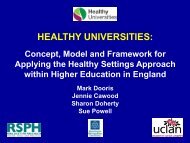Mental health of students in higher education
Mental health of students in higher education - Royal College of ...
Mental health of students in higher education - Royal College of ...
- No tags were found...
You also want an ePaper? Increase the reach of your titles
YUMPU automatically turns print PDFs into web optimized ePapers that Google loves.
Appendix 6The Westm<strong>in</strong>ster mentor<strong>in</strong>g programme is different because it utilisesstaff from the exist<strong>in</strong>g counsell<strong>in</strong>g service <strong>in</strong>stead <strong>of</strong> recruit<strong>in</strong>g externalmental <strong>health</strong> advisors. Thus the mentors are already familiar with theuniversity environment and with the particular issues faced by Westm<strong>in</strong>sterUniversity <strong>students</strong>. Other advantages are that, as tra<strong>in</strong>ed counsellors,mentors have the experience and knowledge to spot the warn<strong>in</strong>g signswhen a student is on the verge <strong>of</strong> a psychological crisis. The programme isproactive and preventative. It enables <strong>students</strong> to become more autonomous<strong>in</strong> relation to their academic career and leave or suspend their studies withdignity if this is the right course <strong>of</strong> action for them. Above all, it <strong>of</strong>fers alifel<strong>in</strong>e before <strong>students</strong> start to flounder and supports them throughout theirtime at university, not just at crisis po<strong>in</strong>ts.Work on improv<strong>in</strong>g the programme is ongo<strong>in</strong>g and most recently arevision <strong>of</strong> record<strong>in</strong>g and referral methods has taken place to ensure that<strong>in</strong>formation is passed on to relevant parties to enable <strong>students</strong> to receivethe most appropriate help.Oxford University: Peer Support ProgrammeThe service tra<strong>in</strong>s <strong>in</strong> the region <strong>of</strong> 250 <strong>students</strong> each year <strong>in</strong> basic listen<strong>in</strong>gand support skills. This is a 30-hour tra<strong>in</strong><strong>in</strong>g at the end <strong>of</strong> which <strong>students</strong>can advertise themselves as part <strong>of</strong> the Peer Support Panel <strong>in</strong> their collegeor department provid<strong>in</strong>g they cont<strong>in</strong>ue to attend fortnightly monitor<strong>in</strong>g/supervision groups with their tra<strong>in</strong>er (who is also a qualified counsellor).As well as cross-college tra<strong>in</strong><strong>in</strong>gs, a specific tra<strong>in</strong><strong>in</strong>g is <strong>of</strong>fered each yearas a special study module <strong>in</strong> the 4th year at the graduate medical schooland as an <strong>in</strong>tensive, pre-course tra<strong>in</strong><strong>in</strong>g to a cohort <strong>of</strong> Master <strong>of</strong> Bus<strong>in</strong>essAdm<strong>in</strong>istration (MBA) <strong>students</strong> <strong>in</strong> the Saïd Bus<strong>in</strong>ess School, University <strong>of</strong>Oxford. A modified tra<strong>in</strong><strong>in</strong>g is delivered before the beg<strong>in</strong>n<strong>in</strong>g <strong>of</strong> the academicyear for graduate <strong>students</strong> who have a def<strong>in</strong>ed welfare role such as juniordeans <strong>in</strong> colleges. About 4% <strong>of</strong> the <strong>students</strong> who use the counsell<strong>in</strong>g servicehave been referred by peer supporters, who also refer to medical serviceswith<strong>in</strong> and attached to colleges. For further <strong>in</strong>formation see www.adm<strong>in</strong>.ox.ac.uk/shw/peers.shtmlUniversity <strong>of</strong> Hertfordshire: tutor tra<strong>in</strong><strong>in</strong>gprogrammeThe University <strong>of</strong> Hertfordshire counsell<strong>in</strong>g service has developed an<strong>in</strong>tensive 10-week course for personal tutors and other <strong>in</strong>terested staff with aview to rais<strong>in</strong>g awareness <strong>of</strong> the psychological factors affect<strong>in</strong>g teach<strong>in</strong>g andlearn<strong>in</strong>g. The first ‘taught’ half <strong>of</strong> a session covers issues such as manag<strong>in</strong>gthe boundaries around the role <strong>of</strong> personal tutor, transitions, exam andlearn<strong>in</strong>g difficulties, creat<strong>in</strong>g helpful <strong>in</strong>teractions with <strong>students</strong>, recognis<strong>in</strong>grisk, and break<strong>in</strong>g bad news. The second half comprises presentationsfrom course members about current issues <strong>in</strong> their work, with the aim<strong>of</strong> <strong>in</strong>tegrat<strong>in</strong>g theory with practice. The course is part <strong>of</strong> the pr<strong>of</strong>essionalacademic development programme at the university and can be taken forcredit. It has helped members <strong>of</strong> staff <strong>in</strong> their <strong>in</strong>teractions with <strong>in</strong>dividual<strong>students</strong> and has also led to their devis<strong>in</strong>g supportive structures with<strong>in</strong> theirdepartments. For more <strong>in</strong>formation contact counsell<strong>in</strong>g.centre@herts.ac.ukRoyal College <strong>of</strong> Psychiatrists87





